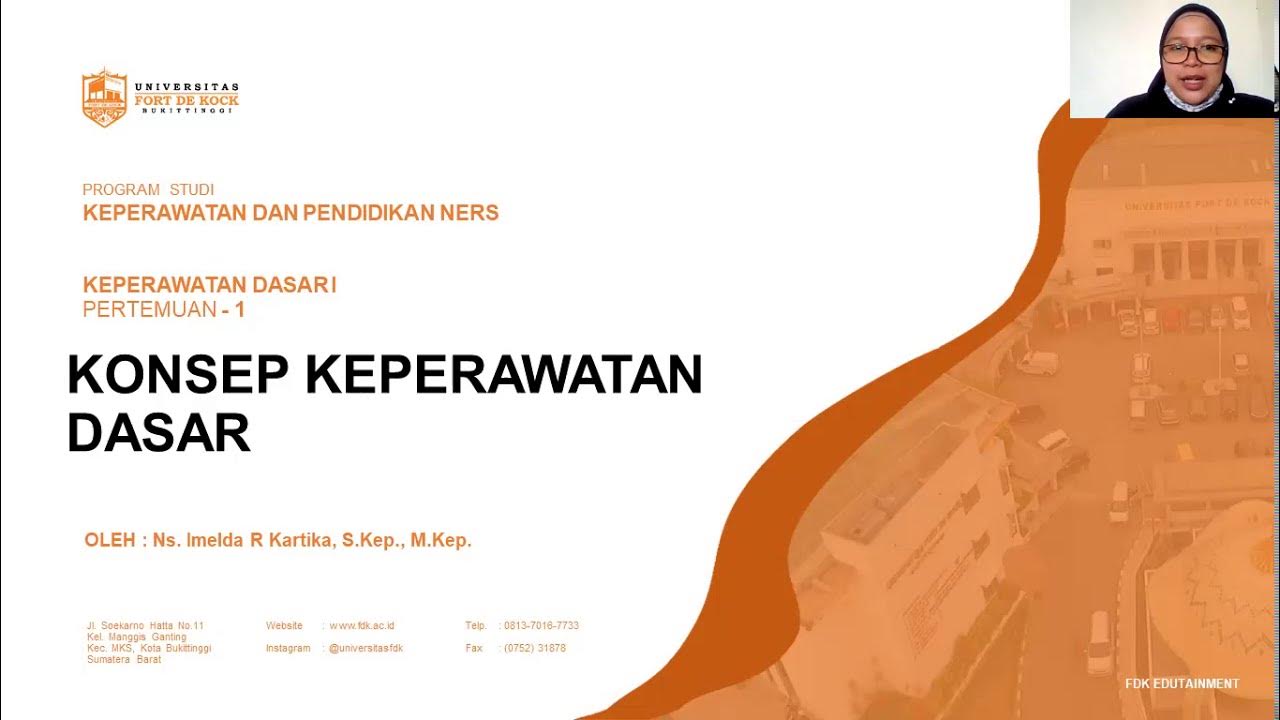Theoretical Foundations of Nursing Practice Fundamental of nursing
Summary
TLDRThe script covers essential nursing theories, focusing on the nursing paradigm of person, health, environment, and nursing. It explains how various nursing theories, including those by Pavlov, Orem, Roy, and Nightingale, guide patient care in different contexts. The script also highlights the importance of interpersonal relationships between nurses and patients, theory-based practice, and evidence-based practice. Key concepts include Maslow's hierarchy of needs, patient self-management, and cultural competence in nursing. It emphasizes the role of scientific knowledge, interdisciplinary approaches, and the testing of theories to predict patient outcomes.
Takeaways
- 🧑⚕️ Nursing meta-paradigm includes person, health, environment, and nursing, with each element interacting around the patient.
- 🤝 Pavlov's theory emphasizes the importance of nurse-patient interaction and understanding of patient needs, influenced by both nurse and patient preconceptions.
- 📚 Nursing theories are critical for explaining phenomena, predicting patient outcomes, and guiding nursing practice.
- 🌍 Florence Nightingale’s theory focuses on providing a clean, well-ventilated, and quiet environment for patients.
- 👩🔬 Orem's self-care theory is used to promote patient self-management for chronic illnesses like diabetes.
- 💡 Nursing theories differentiate nursing from other disciplines and help coordinate care through evidence-based practices.
- 🏥 Roy’s theory helps patients adapt to changes, such as dealing with the loss of a limb after an accident.
- 🌐 Leininger's theory of transcultural nursing addresses the care of patients from unique cultural backgrounds.
- 🏗️ Maslow’s hierarchy of needs prioritizes basic needs like air, water, and nutrition in acute care settings.
- 🛠️ Middle-range theories are especially influential in evidence-based practice, focusing on practical interventions and outcomes.
Q & A
What are the main components of the nursing paradigm?
-The main components of the nursing paradigm include person, health, environment, and nursing, with all elements interacting with one another, and the patient being central to the process.
What is the focus of the nurse-patient relationship according to Pavlov's theory?
-According to Pavlov's theory, the nurse-patient relationship involves interaction between the nurse and patient, clarifying and describing the patient's needs, and is influenced by both patient and nurse preconceptions.
Why are interdisciplinary theories important in today's health care environment?
-Interdisciplinary theories are important because they address the evolving health care needs of patients, focusing on health promotion, illness prevention, and treatment, involving multiple disciplines to deliver effective patient care.
Which theory is used to describe the life processes of an older adult facing chronic illness?
-Developmental theories are used to describe and predict behavior and development at various life phases, including older adulthood, for patients facing chronic illness.
What is the role of theory in nursing practice?
-Theories in nursing practice explain phenomena, such as self-care or caring, and provide a framework for guiding nursing practice, predicting patient behavior, and generating nursing knowledge.
Which nursing theorist emphasizes the importance of a clean, well-ventilated environment for patient care?
-Florence Nightingale emphasized the importance of a clean, well-ventilated environment as part of her environmental theory of nursing care.
Which nursing theory is helpful in promoting patient self-management, particularly for chronic diseases like diabetes?
-Orem's theory of self-care is helpful in promoting patient self-management by directing patients towards maintaining health and sustaining wellness.
How does theory-based nursing practice contribute to patient care?
-Theory-based nursing practice contributes to patient care by differentiating nursing from other disciplines, coordinating care delivery, generating nursing knowledge, and linking theory to evidence-based practice.
Which theory focuses on helping patients adapt to changes after significant events, such as losing a limb?
-Roy's adaptation theory focuses on helping patients cope and adapt to changes, such as losing a limb, by promoting effective adjustment to new life circumstances.
Which of Maslow's hierarchy of needs is the immediate priority for a patient with severe diarrhea and labored breathing?
-The immediate priority for this patient is 'air, water, and nutrition,' as the patient requires sufficient air exchange and fluid balance for stabilization.
Outlines

Esta sección está disponible solo para usuarios con suscripción. Por favor, mejora tu plan para acceder a esta parte.
Mejorar ahoraMindmap

Esta sección está disponible solo para usuarios con suscripción. Por favor, mejora tu plan para acceder a esta parte.
Mejorar ahoraKeywords

Esta sección está disponible solo para usuarios con suscripción. Por favor, mejora tu plan para acceder a esta parte.
Mejorar ahoraHighlights

Esta sección está disponible solo para usuarios con suscripción. Por favor, mejora tu plan para acceder a esta parte.
Mejorar ahoraTranscripts

Esta sección está disponible solo para usuarios con suscripción. Por favor, mejora tu plan para acceder a esta parte.
Mejorar ahoraVer Más Videos Relacionados

Theoretical Foundations of Nursing Overview

ERNISTINE WIEDENBACH

Quick Lesson in Nursing History and The Nursing Theory

THEORETICAL GUIDE TO NURSING THEORIES: Nursing Theories- History of Nursing Theories and more..

FUNDAMENTALS OF NURSING - PART 1

Keperawatan Dasar 1 (P.1) | Dosen Ns. Imelda Rahmayunia Kartika, M.Kep
5.0 / 5 (0 votes)
